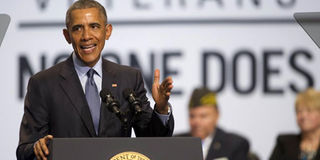Obama is a great communicator who is not afraid to scold impertinent reporters

US President Barack Obama. PHOTO |
What you need to know:
- Assuming the complaints are justified, this suggests that the free media, all over the world, behave the same way regardless of how well developed they are or the country in which they operate.
- Apart from his masterly use of social media, President Obama has extraordinary communication skills. His July 27, 2004, inspirational speech to the Democratic National Convention catapulted him to national politics.
- One of his earliest complaints about the media was the way in which they focused on conspiracy theories that he is not a “natural-born” citizen of the United States and was, therefore, ineligible to be president under Article 2 of the US constitution.
President Barack Obama often stands up to the Press and tells off reporters who ask what he considers to be stupid questions.
The last time he did this was on July 14, when a CBS correspondent asked a personalised question about the nuclear agreement with Iran.
“That’s nonsense. And you should know better,” he told him angrily. He also chastises the media for what he calls irresponsible journalism, sensationalism, negativity, triviality, and lack of balance and fairness.
These are the same issues that Kenyan politicians (and some readers) complain about. Assuming the complaints are justified, this suggests that the free media, all over the world, behave the same way regardless of how well developed they are or the country in which they operate. This is instructive.
President Obama and Kenyan politicians also try to use the media in similar ways to advance their political causes, though the American leader is more adept and keenly aware of the power of the media. In his 2006 book, The Audacity of Hope, he says: “For the broad public at least, I am who the media say I am.
I say what they say I say. I become who they say I’ve become.” Those words are not only a subtle criticism of the media but also recognition of the importance of the media in shaping the image of public officials.
He skilfully used social media to fuel his political campaign in 2008 and 2012, attracting millions of followers. When Kenyan presidential candidates in 2013 tried to pull off a similar feat they found that it was not so easy.
Ask, for example, Peter Kenneth (297,000 followers) or Martha Karua (398,000 followers), who could not turn their followers into voters on the ground.
Apart from his masterly use of social media, President Obama has extraordinary communication skills. His July 27, 2004, inspirational speech to the Democratic National Convention catapulted him to national politics.
One of his earliest complaints about the media was the way in which they focused on conspiracy theories that he is not a “natural-born” citizen of the United States and was, therefore, ineligible to be president under Article 2 of the US constitution.
He was born on August 4, 1961, in Honolulu, Hawaii, but quite a number of Americans — 27 per cent of all Americans, according to a July 2010 poll reported by CNN — still believe he was born in Kenya or Indonesia.
The so-called birthers used the media to circulate the theories. At a press conference on April 27, 2011, he rebuked the media for focusing on the theories. “We do not have time for this kind of silliness. We’ve got better stuff to do,” he said.
President Obama has also criticised the tyranny of “the news cycle”, in which a piece of news, such as the birthers’ conspiracy theories, is repeated again and again on radio and TV. He has criticised the media in particular for focusing on trivialities rather than substance, and “false balance” in which two opposing sides are given equal weight regardless of the facts.
He has complained that the media have become irresponsible and negative. On September 1, 2014, he said if you watch the nightly news, “it feels like the world is falling apart.”
On September 9, 2009, at a memorial service for Walter Cronkite — the famous anchor of the CBS Evening News — he said the journalism that Cronkite practised represented “a standard of honesty and integrity and responsibility” that is difficult to find today.
On May 4, 2014, at Barnard College in New York, he advised students not to believe the media. “Good news doesn’t get the same kind of ratings as bad news anymore.
Every day you receive a steady stream of sensationalism and scandal,” he said. And on October 7, 2014, he blamed the media for spreading negativity and focusing too much on “phony scandals” rather than on the progress of the United States. He argued that the media were spreading “cynicism” and trying to divide Americans.
His criticism, which some journalists see as an attack on media freedom, show that the media face similar challenges in their dealings with politicians regardless of the country in which they operate. And Kenyans who complain about the media are in good company. It is a sobering thought.
Send your complaints to [email protected]. Call 3288000, mobile 0721989264





